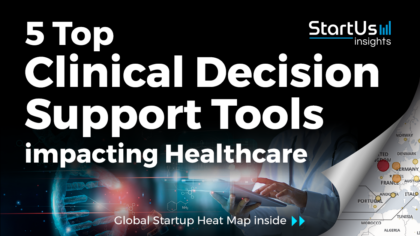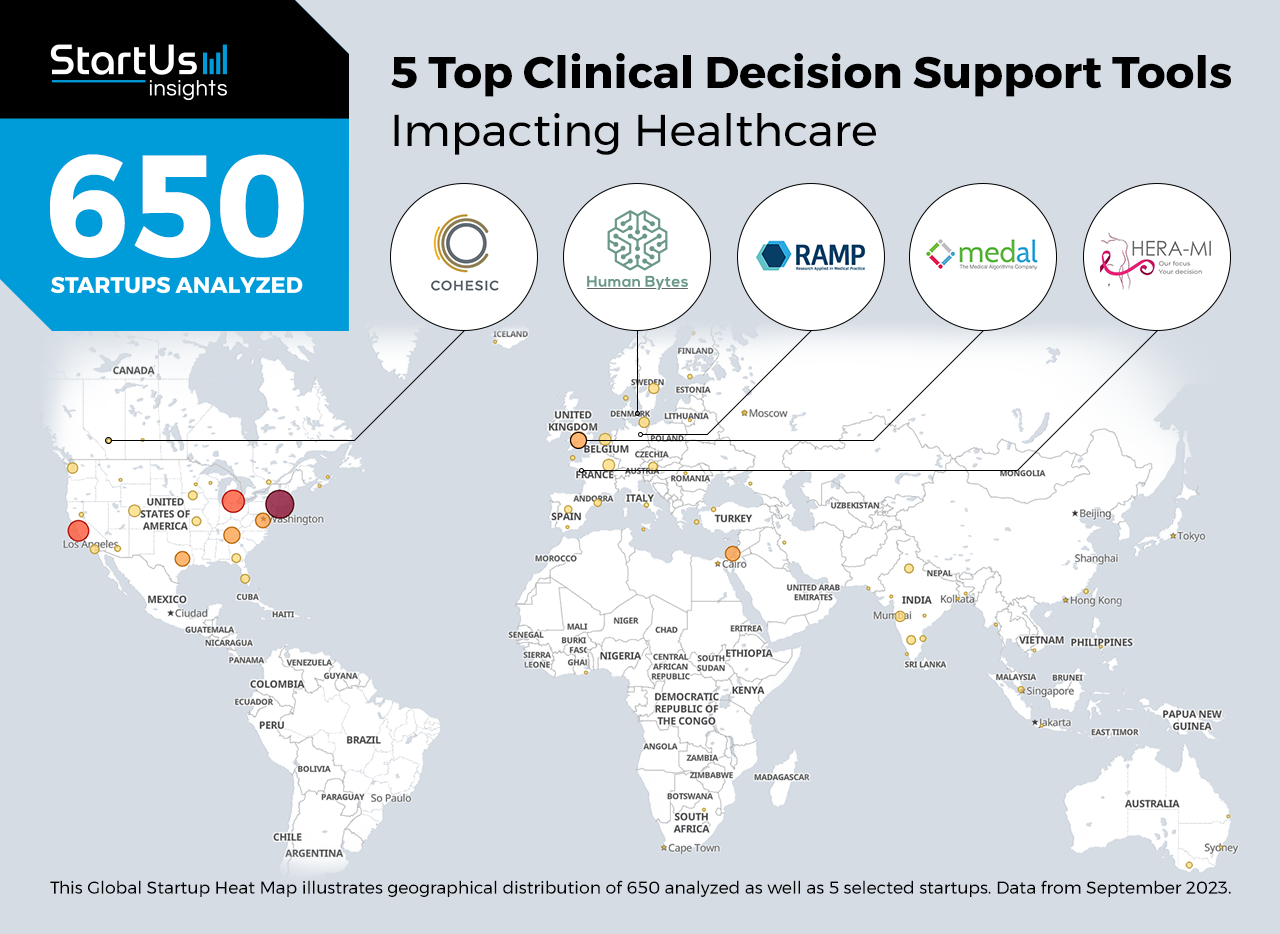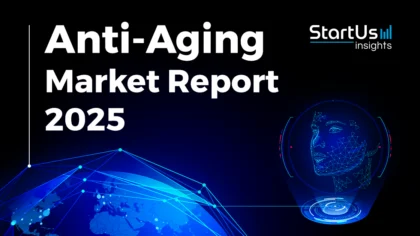Accelerate Productivity in 2025
Reignite Growth Despite the Global Slowdown
Our Innovation Analysts recently looked into emerging technologies and up-and-coming startups working on solutions for the healthcare industry. As there are a lot of such startups working on various different applications, we want to share our insights with you. Here, we take a look at 5 promising clinical decision support tools.
Heat Map: 5 Top Clinical Decision Support Tools
Through the Big Data & Artificial Intelligence (AI)-powered StartUs Insights Discovery Platform, covering over 3 790 000+ startups & scaleups globally, we identified 650 clinical decision support companies. The Global Startup Heat Map below highlights the 5 clinical decision support startups you should watch as well as the geo-distribution of all 650 startups & scaleups we analyzed for this research. Based on the heat map, we see high startup activity in the US and Western Europe.
Interested to explore all 600+ clinical decision support startups & scaleups?
5 Emerging Clinical Decision Support Startups
RAMPmedical provides Therapy Decision Support
Notifications and reminders are commonly associated with clinical decision support tools. They follow the clinician’s actions, prescriptions, and recommended procedures and notify the user via a pop-up alert. Warnings, reminders, or notifications appear if the doctor prescribes medicines that cannot be taken together, if a patient has an allergy to some components, or if a drug is not recommended during pregnancy, etc. While important in many situations, this type of clinical decision support tool should be used sparingly, as there’s a high risk of “alert fatigue”.
The German startup RAMPmedical builds a therapy decision support platform enabling doctors to make the optimal therapy decision for each patient among varieties of provided treatment schemes. The software analyzes the chosen treatment guidelines, presents the results to doctors, and provides them with the necessary information about potential risks and conflicts.
Medical Algorithms Company offers Evidence-based Medical Analytics
Utilizing document templates as clinical decision support tools ensures that appropriate data is collected and recorded. Well-designed templates allow clinicians to enter the required data and important additional information in order to get a full picture of the patient’s condition including symptoms, complaints, mood, etc., which is especially important in multidisciplinary cases. Additionally, templates enable clinicians to clearly and accurately record documentation details to be processed by algorithm-based programs, that analyze the patterns and learn from them.
The UK-based Medical Algorithms Company creates Medal, a decision support tool for healthcare professionals with evidence-based medical analytics to improve clinical practice and health outcomes. The system works based on more than 20,000 algorithms and logical decision-making tools to provide medical staff with checklists and recommendations, tailored to their different medical specialties. The predictive analytics platform aims to ensure precise and errorless documentation for medical diagnostics, treatment, and monitoring to make patient assessment accurate and reliable.
Cohesic delivers Guided Clinical Workflows
This type of clinical decision support tool provides aid for clinical decision-making in multi-step care plans from a long-term care perspective. It provides evidence-based guidelines, recommendations, and pathways at the right time thereby informing about the next steps based on previous results and treatment reactions. This approach is also applicable in situations such as the current Coronavirus pandemic when the medical staff has to follow the same strict guidelines and needs to be informed simultaneously.
Cohesic, a Canadian startup, works on a Care Intelligence Platform that offers data-driven decisions in cardiovascular care via diagnostic workflow. The platform also features structured reporting software and enables diagnostic test providers and clinicians to increase the efficiency of reporting, reduce medical errors and receive greater insights into their patient’s health.
HERA-MI offers Diagnostic Decision Support
Clinical decision support systems (DSS) aim to support and assist with clinical decision-making tasks in diagnostics. They help clinicians consider a variety of diagnoses, ask patients more targeted questions, request some of the patient’s data, and in response, propose a set of appropriate diagnoses. Diagnostic decision support tools are integrated with the electronic health record (EHR) and suggest a checklist of symptoms and signs in relation to each suggested diagnosis based on a patient’s history.
The French startup HERA-MI develops a clinical decision support system based on machine learning and medical imaging processing that improves breast cancer early detection. Artificial Intelligence (AI) enables radiologists to decrease the time they spend on non-problematic cases and spend extra time on more complicated ones.
Tapa Healthcare provides Condition-Specific Sets
Order sets represent another group of clinical decision support tools that work as a pre-defined template for clinical decision-making for a specific condition or medical procedure. This might be a grouping of orders that helps clinicians effectively choose the appropriate items or steps compared to individual orders that improve adherence to evidence-based practices and reduce the risk of errors.
Human Bytes is a Danish startup that develops a patient monitoring solution. It uses computer vision and AI to monitor patients via installed cameras, detecting situations like falls and wandering among those with dementia. Ward 24/7 is its software that offers intelligent alarms and early detection of clinical deterioration by continuously monitoring vital signs wirelessly. This reduces false alarms compared to manual methods and provides insights into daily patterns and potential health issues, delivering decision support for personalized care.
Discover All Clinical Decision Support System Companies
The decision support tools in healthcare showcased in this report are only a small sample of all startups we identified through our data-driven startup scouting approach. Download our free Industry Innovation Reports for a broad overview of the industry or get in touch for quick & exhaustive research on the latest technologies & emerging solutions that will impact your company!








